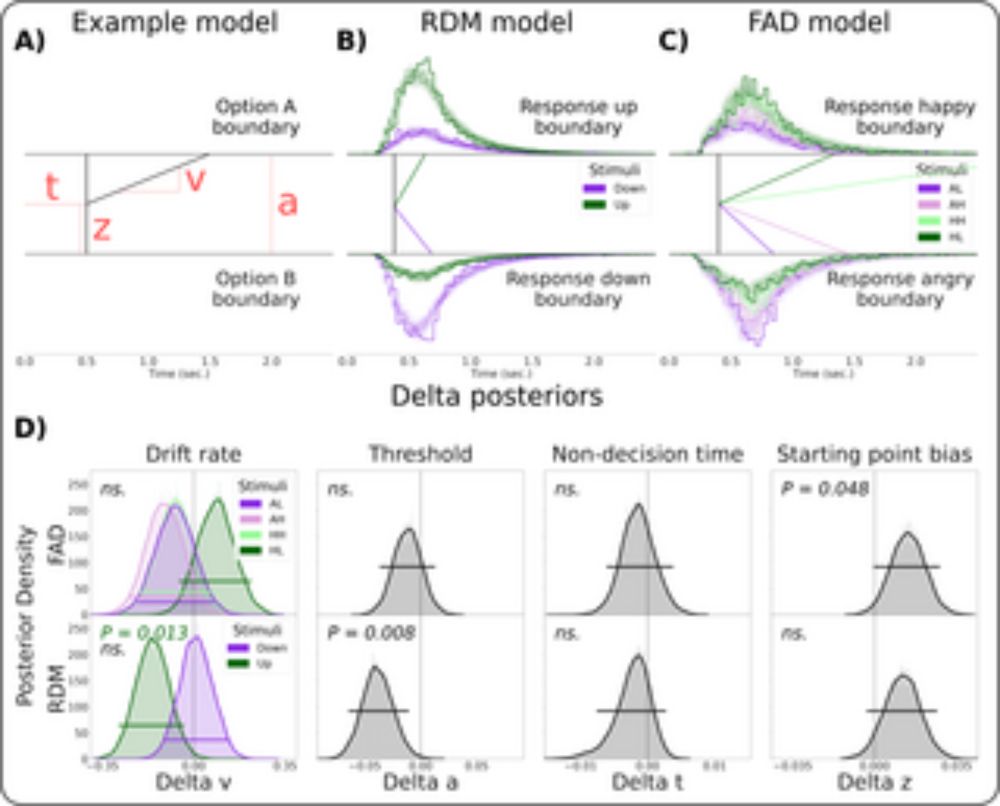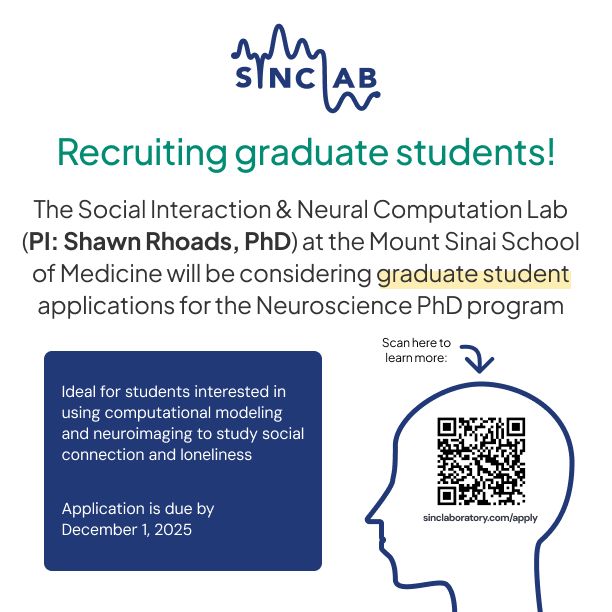We adopt a network neuroscience approach to understand how arousal reconfigures large-scale functional network organization to support memory of complex narratives!

my lab will develop scalable models/theories of human behavior, focused on memory and perception
currently recruiting PhD students in psychology, neuroscience, & computer science!
reach out if you're interested 😊


my lab will develop scalable models/theories of human behavior, focused on memory and perception
currently recruiting PhD students in psychology, neuroscience, & computer science!
reach out if you're interested 😊
Thank you to the reviewers and editors for encouraging, insightful and helpful comments. We will be revising the paper, stay tuned!
Thank you to the reviewers and editors for encouraging, insightful and helpful comments. We will be revising the paper, stay tuned!
@plos.org Computational Biology! 🫁
"The respiratory cycle modulates distinct dynamics of affective and perceptual decision-making"
doi.org/10.1371/jour...
We show how respiratory 'tidal computations' alter our decisons!

@plos.org Computational Biology! 🫁
"The respiratory cycle modulates distinct dynamics of affective and perceptual decision-making"
doi.org/10.1371/jour...
We show how respiratory 'tidal computations' alter our decisons!
The Feilong Lab @sc.edu studies commonalities & differences across brains, and how they relate to cognition, language, & disorders.
We develop brain templates, improve hyperalignment, and compare human brains with monkey brains & DNNs.
feilonglab.github.io
The Feilong Lab @sc.edu studies commonalities & differences across brains, and how they relate to cognition, language, & disorders.
We develop brain templates, improve hyperalignment, and compare human brains with monkey brains & DNNs.
feilonglab.github.io
drive.google.com/file/d/19m8i...

drive.google.com/file/d/19m8i...
Her editing/producing skills are next-level - she somehow wrangled my scattered brain into something that actually sounds coherent...
A true miracle worker 😅
@sudkrc.bsky.social chats with Dr. YC Leong @ycleong.bsky.social
of The University of Chicago on how dynamic brain connectivity predicts emotional arousal while watching Sherlock🕵️🧐
🎧LISTEN NOW: open.spotify.com/episode/5W22...

Her editing/producing skills are next-level - she somehow wrangled my scattered brain into something that actually sounds coherent...
A true miracle worker 😅

Come join the CATS Lab: nucatslab.com
Learn about our latest research: iamh.northwestern.edu/research/res...
Come join the CATS Lab: nucatslab.com
Learn about our latest research: iamh.northwestern.edu/research/res...
Learn more: bit.ly/3Lec2Gf
@jadynpark.bsky.social @ycleong.bsky.social

Learn more: bit.ly/3Lec2Gf
@jadynpark.bsky.social @ycleong.bsky.social
Shared computations underlie how we acquire actions that are mutually beneficial, instrumentally harmful (benefits self at the expense of others), altruistic (benefit others at the expense of self), or mutually costly
🧵 rdcu.be/eL8mZ

Shared computations underlie how we acquire actions that are mutually beneficial, instrumentally harmful (benefits self at the expense of others), altruistic (benefit others at the expense of self), or mutually costly
🧵 rdcu.be/eL8mZ
www.biorxiv.org/content/10.1...
@introspection.bsky.social + @escross.bsky.social

www.biorxiv.org/content/10.1...
@introspection.bsky.social + @escross.bsky.social
www.chicagobooth.edu/phd/admissio...

www.chicagobooth.edu/phd/admissio...
We adopt a network neuroscience approach to understand how arousal reconfigures large-scale functional network organization to support memory of complex narratives!
We adopt a network neuroscience approach to understand how arousal reconfigures large-scale functional network organization to support memory of complex narratives!
doi.org/10.1146/annu...
#psychscisky #neuroskyence

doi.org/10.1146/annu...
#psychscisky #neuroskyence
Eric and Wendy Schmidt AI in Science Fellowship at the University of Chicago: apply.interfolio.com/173322
EOE/Vet/Disability
Eric and Wendy Schmidt AI in Science Fellowship at the University of Chicago: apply.interfolio.com/173322
EOE/Vet/Disability
Can getting more rewards make you feel more skilled, even if your performance doesn't change?
www.nature.com/articles/s44...

Can getting more rewards make you feel more skilled, even if your performance doesn't change?
www.nature.com/articles/s44...
www.jneurosci.org/content/earl...

www.jneurosci.org/content/earl...


We welcome applicants interested in using computational modeling & fMRI to study social connection
🗓️ Deadline: December 1, 2025
🔗 Learn more: sinclaboratory.com/apply
#comppsychiatry #socialneuro

We welcome applicants interested in using computational modeling & fMRI to study social connection
🗓️ Deadline: December 1, 2025
🔗 Learn more: sinclaboratory.com/apply
#comppsychiatry #socialneuro
Application info: www.colorado.edu/psych-neuro/...
Lab info: www.svmlab.org

Application info: www.colorado.edu/psych-neuro/...
Lab info: www.svmlab.org
Peter's speed of mind and talk is possibly unsurpassable.
www.youtube.com/watch?v=Cttx...

Peter's speed of mind and talk is possibly unsurpassable.
www.youtube.com/watch?v=Cttx...
osf.io/preprints/ps...
In a sample of ~2 billion comments, social media discourse becomes more negative over time
Archival and experimental findings suggest this is a byproduct of people trying to differentiate themselves
Led by @hongkai1.bsky.social in his 1st year (!) of his PhD


